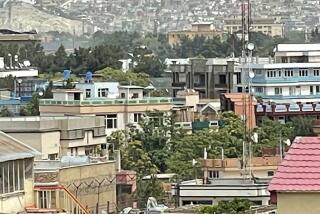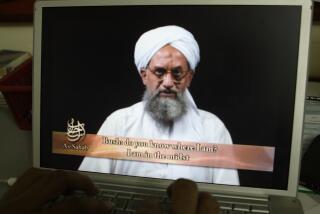Assassins Kill Afghan Official
- Share via
TARIN KOWT, Afghanistan — A pair of gunmen assassinated Afghan Vice President Haji Abdul Qadir in broad daylight Saturday as he drove away from his office in the capital--a crime that clearly destabilized this nation’s fledgling democracy.
Qadir was the most prominent ethnic Pushtun in the government of newly installed President Hamid Karzai, apart from Karzai. Qadir’s appointment was considered crucial to appeasing the demand of his fellow Pushtuns for a voice in the government, which is dominated by ethnic Tajiks.
This was the second assassination of a government minister in less than five months. Air Transportation and Tourism Minister Abdul Rahman, who was killed under still-unexplained circumstances Feb. 14 at the airport in the capital, Kabul, also was a Pushtun. But Qadir’s slaying marked the first such violent incident since Karzai’s 18-month transitional government was sworn in 2 1/2 weeks ago.
In Kennebunkport, Maine, where he is spending the Fourth of July weekend, President Bush said the assassination left the United States “more resolved than ever to bring stability to the country, so the Afghan people can have peace and hope.”
He said that Qadir “desired freedom and stability for the country he loved” and that a national security official had expressed condolences to Karzai and the government and people of Afghanistan, “who lost a good and valued friend.”
The slaying occurred about 12:30 p.m. local time, according to the BBC’s Pashto-language radio service. Police and witnesses said Qadir’s four-wheel-drive Toyota Land Cruiser crashed into a wall as bullets riddled the side and windshield, killing both the vice president and his driver. A bodyguard was injured.
The gunmen escaped.
Karzai rushed to the hospital where Qadir’s body was taken and then summoned his Cabinet to an emergency session. He set up a five-member delegation to investigate the killing. No group claimed responsibility.
Asked whether the United States would offer investigative assistance to Afghanistan to determine responsibility for Qadir’s death, Bush said: “Right now, the Afghan government believes they can handle the investigation. There’s all kinds of scenarios as to ... who killed him. But we’ll work closely with the government if they want us to.”
He said that terrorists could be responsible, but “it could be drug lords, it could be longtime rivals. Who knows?
“All we know,” he said, “a good man is dead, and we mourn his loss.”
However, Afghan Foreign Ministry spokesman Omar Samad called the killing a “terrorist action” carried out by “enemies of the state who are against peace in the country.”
Qadir was one of Karzai’s five vice presidents and was also the minister for public works. His decision to join the new government was considered a victory for Karzai in his effort to bring warlords with strong regional bases into the Kabul administration as part of a strategy for unifying the country.
A longtime moujahedeen commander, Qadir was one of the few ethnic Pushtuns to join with the Tajik-dominated Northern Alliance in its fight against the hard-line Taliban regime, which toppled last fall. His family in recent years has staunchly opposed the Taliban, and his brother Abdul Haq was executed by the Taliban last year when he was captured after entering the country secretly to organize a Pushtun rebellion.
Qadir’s death underscored the fragility of the new government and the difficulties facing Karzai as he attempts to stabilize this country after 23 years of war. Afghanistan is as much a collection of provinces, each with its own powerful commander, as it is a unified nation, and now that a centralized government is taking shape, intense rivalries are becoming deadly.
In April, Qadir survived a bomb attack aimed at Defense Minister Mohammed Qassim Fahim, a Tajik, as he accompanied Fahim on a visit to the eastern city of Jalalabad. The attack was widely viewed as a Pushtun protest against Tajik domination in Kabul.
In the capital Saturday, conjecture about the identity of the assassins ranged from fellow Pushtuns with old grudges to drug-dealing competitors and rivals who want more power in eastern Afghanistan.
Qadir, a tall man with a trim white beard, had a controversial past and many enemies. An articulate and intelligent figure who spoke English and was tremendously popular in his home base of Jalalabad, he was a significant player in almost every chapter of Afghanistan’s recent history.
Born into a prominent and influential family in Jalalabad, he was one of the most prominent of the guerrilla commanders during the 1980s war against the Soviet occupation. When that regime ended, he became a successful businessman. His family owned an airline in the 1990s that it used to import goods from Dubai and sell in Pakistan, which borders his home province.
In the mid-1990s, he became governor of Nangarhar province, before the Taliban took power, and welcomed suspected terrorist Osama bin Laden when he arrived in Jalalabad with a number of Arab followers from Sudan. Although there is no reason to think that Qadir supported Bin Laden’s political views, he allowed the terrorist leader to use cave complexes that later became Al Qaeda bases.
As governor of Nangarhar from 1992 until 1996, Qadir was often criticized by the United Nations drug control program for not doing enough to curb poppy production in the province, one of the largest poppy-producing regions of the country. Poppies are used to make opium and heroin. More recently, he talked about his efforts to persuade Nangarhar farmers to stop planting poppies, but he appears to have allowed them to harvest this year’s crop.
Qadir had an intense rivalry with another commander in eastern Afghanistan, Haji Mohammed Zaman, whose forces were allied with the United States in its December assault on Tora Bora, the mountain cave complex in the eastern province of Nangarhar where Bin Laden was thought to have been hiding. Zaman lost out when Qadir was reappointed governor of Nangarhar after the fall of the Taliban, but with Qadir’s move to the capital as vice president, it appeared likely that Zaman might use his absence as an opportunity to augment his power in Jalalabad.
In a separate development Saturday, U.S. military authorities acknowledged for the first time that Afghan civilians were killed in U.S. bombing raids Monday in the eastern province of Oruzgan.
At a news conference in Kabul, Army Lt. Gen. Dan McNeill, commander of U.S. forces in the country, said a preliminary U.S.-Afghan inquiry into the incident had determined that there were civilian deaths and injuries in the attack, which struck several hamlets in the province.
McNeill said a formal investigation would be conducted to unearth more details and to determine whether U.S. forces should change their method of operations in the region.
Afghans, including Karzai, have complained publicly about the raid, which allegedly killed a large number of Afghans attending a wedding ceremony at Kakarak. Afghan Foreign Minister Abdullah, who appeared at the news conference with McNeill, said that by the latest count, 48 people were killed and 117 wounded in the raid.
McNeill said the preliminary investigation indicated that there were several reports from sources on the ground and in the air suggesting that U.S. aircraft had been targeted by antiaircraft fire at the time of the attack.
Investigators found some shrapnel and shell casings near the attack site, but they did not find an antiaircraft gun, he said.
McNeill said U.S. investigators had not been able to examine any of the dead, who had already been buried.
Though the incident has caused strains in the alliance, McNeill and Abdullah sought to emphasize their intent to forge ahead and put the incident behind them.
“It is important that we keep this coalition together and properly oriented,” McNeill said. “We are guests, and they are our allies.”
*
Times staff writers James Gerstenzang in Kennebunkport and Paul Richter in Washington contributed to this report.
More to Read
Sign up for Essential California
The most important California stories and recommendations in your inbox every morning.
You may occasionally receive promotional content from the Los Angeles Times.










